.hack//G.U. Last Recode Development Background Explained by CyberConnect2
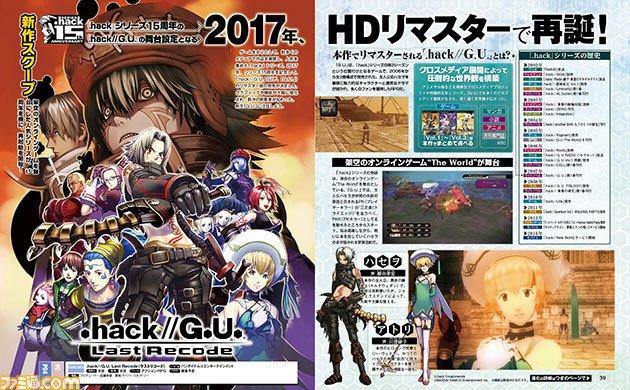
Still hot on the reveal of .hack//G.U. Last Recode - an HD remaster of the entire .hack//G.U. trilogy - on this week's Weekly Famitsu, we have taken hold of the magazine itself which was just recently published. While most of the preliminary information has been covered in our prior article, the magazine also has an interview with Hiroshi Matsuyama, the president of CyberConnect2 who also appeared in the .hack games himself as Piros, and Daisuke Uchiyama, head of Bandai Namco Entertainment's console division and also the producer of the original .hack tetralogy and .hack//G.U. trilogy.
It was also confirmed outside the interview that .hack//G.U. Last Recode will support 4K video output in addition to 1080p. We have fully translated the interview which can be read after the jump.
(Note: If you see .hack// it will refer to the first .hack tetralogy (Infection, Mutation, Outbreak, Quarantine), while if you see .hack without the slashes it will refer to the entire .hack metaseries)
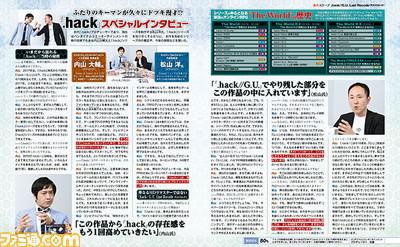
Secrets about .hack// in the past that can finally be talked about now
Famitsu : First of all, we’d like to start hearing from the details of this game getting produced.
Uchiyama: The year 2017 is the 15th anniversary of the release of .hack[//Infection], and 10 years have passed since G.U. was completed. Furthermore, G.U. also took place in 2017. In this year that we must commemorate, we’d like to reboot the .hack series which had been resting away from home console for a while.
Famitsu : Why did you choose to do an HD remaster instead of a new title for the series?
Matsuyama: A long time has passed, so first as an entry course, we’re going to let the current young generation know about the .hack series.
Uchiyama: By letting our customers (read: players) at that time [of the original PS2 releases] to remember once more with this game, and by also letting the current customers know about .hack, we want to plan for the next expansion. That’s why we’re thinking to heighten the presence of .hack series once more with this game.
Famitsu : Speaking about .hack series, the way of doing a media-mix expansion with an original title was a rare thing back then.
Uchiyama: At the time of the first .hack//[Infection], at first we didn’t think that far. We included various media, but it was all a hindsight-based opinion (laughs). We became aware of it in the midway.
Matsuyama: Because it was an original RPG made by a production company not known by anyone, it wouldn’t be considered by Bandai at that time unless we could show a color that’s different from other past projects. So to involve people who already have their own fans, we persuaded Mr. Kazunori Ito and Mr. Yoshiyuki Sadamoto.
Uchiyama: It took about half a year each [to persuade them one by one].
Matsuyama: And then, the PlayStation 2 was released, DVD became able to be played in game consoles, so we’d like to make an episodic composition like an OVA with the pair of game and anime. And then things like TV anime, comicalization, and novels were being talked upon as the project was moving on. By doing that, while we were creating .hack//, the shape itself would change. In a good meaning, we started without fitting into a mold and we could do anything we want. I think that was a big point.
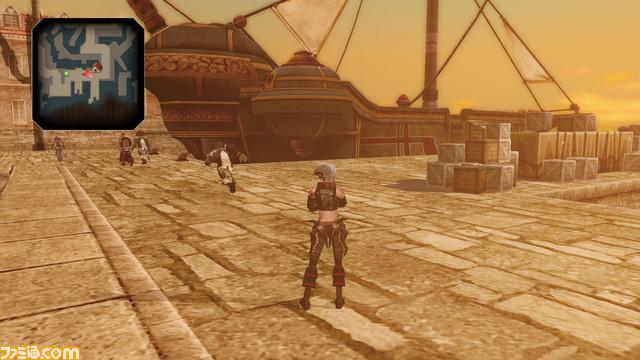
Famitsu : How did the theme and concept of .hack// get decided?
Uchiyama: We began polishing up the plan to decide the theme in around 2000. At that time, people were discussing the immersivity of online games and the burst of the IT bubble [in Japan], and there was an atmosphere where ‘both online games and the internet are dangerous.' However, kids around the age of middle schoolers would want to experience it even for a bit.
When proposing new things, I thought these would become good themes. It went well by chance, but I never thought it would become a theme that could still live even after 15 years.
Matsuyama: Regarding the concept, we first decided it to be a “double composition of real world and game world taking place in a fictional online game."
Uchiyama: When we had a meeting for the scenario, I remember Mr. Ito said, ‘What would happen to an in-game world after a reset button was pressed in an RPG?' We then decided on the game’s skeletal structure from there.
Matsuyama: The concept of all 4 volumes of .hack// was valued not only in Japan but also overseas.
Uchiyama: I never thought it would sell so well in America. Bandai at that time excelled in selling game adaptations of popular anime and manga to the world, but spreading works created by ourselves to the world was not necessarily our specialty.
Matsuyama: That’s why everyone cooperated to go around places and make appeals. For example in Europe, we went around 5 countries within 5 days.
Uchiyama: Nowadays producers from our company would travel around 7-8 countries in Europe to do PR for their works. But I think .hack was the project that opened up the way of selling [games] overseas.
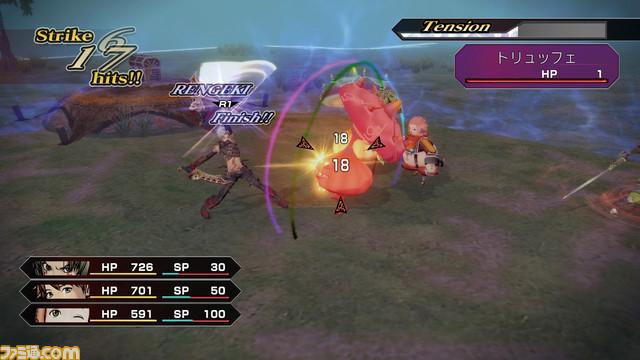
.hack//G.U. Last Recode is not just a simple HD remaster
Famitsu : What’s the reason for you remastering G.U. this time, out of the many series titles?
Matsuyama: .hack// had a protagonist that was caught up [in a plot], and I think it was to be played with a sense that “Kite = Yourself” (as in Kite is really the player’s own character). That’s why the frontage was also wide.
But in the next series G.U., we wanted to make it a title where fans would get deeply attached to the protagonist and other characters, so we made it with high heat like a shonen manga. It didn’t sell as much as .hack//, but the fans’ enthusiasm towards the characters and storyline is the highest in the series. That’s why if we are to do a reboot from among the series, G.U. ought to be the most suitable.
Furthermore, there are also some parts in G.U. that we wanted to do but still haven’t yet. Since we also wanted to put those into shape, we decided on it.
Famitsu : When you were making G.U., what would be the parts you changed from .hack// that you were aware of?
Matsuyama: Unlike .hack// where “the protagonist = yourself”, we made Haseo’s story to be enjoyable from a bird’s eye view. Even with the same RPG genre, the way of creating [each of them] is different.
Uchiyama: It’s like the methodology of the production is different. At the time of .hack// we would fill in the interludes, but G.U. would have the nature of movie production. I think the heat of CyberConnect2’s movie presentation can be enjoyed better here [in G.U.].
Famitsu : For the contents, will you be able to play all 3 G.U. volumes in HD here?
Matsuyama: Normally it would be so. But neither CyberConnect2 or .hack are normal. It may look like a simple HD remaster, but we’ve re-created most of them. We’ve re-tuned it so that the tempo would be better, and we removed all parts that people think would be troublesome and common in old games. The balance and responsiveness will be totally different.
Famitsu : So the base will be the systems of Vol.3 [Redemption] which was the most comfortable. Are you making it so that players can progress without having stress?
Matsuyama: Yeah. That’s why the overall play time will also become 1-2 hours shorter in each volume.
Famitsu : I see. So it’s not just a simple HD remaster, but the play feel will also completely change.
Matsuyama: Actually, that’s not the only thing. The entire 3 volumes of G.U. lead to one conclusion. But on whether a true salvation would be indeed there or not, there are also parts that may not seem so.
It ended with a feel like, “Someday, I will see a dream of such a day”, but this game will have the answer to the question of “When will that someday be?”. I think everyone will get to meet the “how do you do” Haseo that they didn’t know of before.
Famitsu : Are there going to be any more new features?
Uchiyama: You should look forward to that in the future. Mr. Matsuyama has ended up spoiling much of it though (laughs).
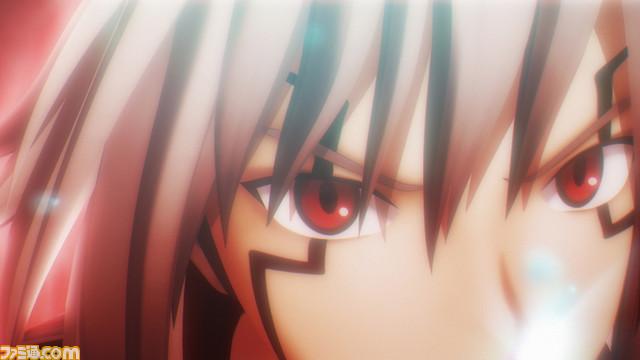
Famitsu : By the way, to match with the commemoration of the 15th anniversary, are there any projects in motion other than this game?
Matsuyama: They’re in motion at our company’s side (CyberConnect2). We are making a number of projects. After that, it’s up to this boss (referring to Uchiyama) on whether he would stamp the seal or not.
Uchiyama: But I’m in the position to say ‘you shall not pass through here that easily!’, you know (laughs).
Matsuyama: Anyway, this year, I’m thinking of various events to liven up the 15th anniversary, with this game at the core. For the next expansion of the project itself, please give us a bit more time. First of all, I shall have this boss stamp the seal (laughs).
Famitsu : Finally, would the two of you please leave a message to Famitsu readers.
Uchiyama: As it’s the 15th anniversary of .hack//, and also as 10 years have passed since G.U. was completed, I’m purely glad it has been played for this long. I think the heat of that time - when I kept running in a daze while having comical dialogues with Matsuyama- have arrived in the present day. First of all, please enjoy the 15th anniversary of this game, and I hope it will give power to the projects after that. Please kindly enjoy it.
Matsuyama: This game is like a title with some sort of tenacity for us, so we’re not slacking for even a bit. We’re making it as a game for the newest PlayStation, with contents that will satisfy both people of “how do you do” and “it’s been a long time." The information [published] this time is not all of it. I think in the next information you will surely be surprised again, so please look forward to it.
And this year is a special year for .hack, so we’d like to hype it up together with our customers, so I’d like to close this with the quote, 'Kept you waiting, huh?'
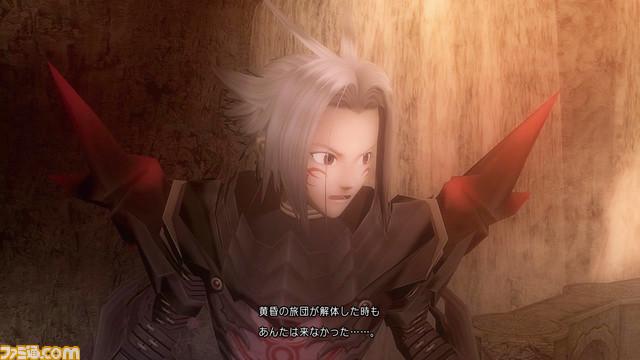
.hack//G.U. Last Recode will be released for the PlayStation 4 and PC in Japan. No release date or English localization has been announced as of yet.